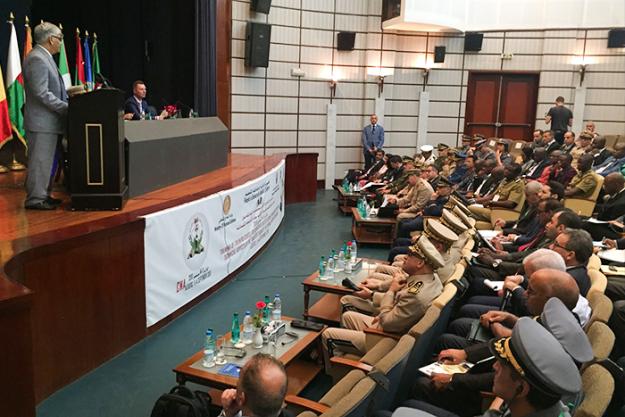
THE HAGUE, the Netherlands — 14 September 2018 — The Deputy Director-General of the Organisation for the Prohibition of Chemical Weapons (OPCW), Ambassador Hamid Ali Rao, stressed the key role of customs authorities in stopping illegal cross-border transfers of chemicals, during his opening speech at a training-for-trainers in Algiers, Algeria on 11 September.
Ambassador Rao addressed more than 50 officials from 11 French-speaking OPCW Member States in Africa who gathered for four days of study about technical aspects of the Chemical Weapons Convention (CWC) transfers regime of scheduled chemicals. The participants represented National Authorities, customs authorities, and training institutions.
The Deputy Director-General underlined the importance of capacity-building for customs officials who stand on the frontline of CWC transfers regime implementation. He noted that strong transfer controls are critical to the countering of the threat of non-State actors accessing and misusing toxic chemicals.
As the course aims to produce trainers who will further transmit their knowledge to others, Ambassador Rao encouraged the participating customs institutions to introduce CWC modules into their regular training programmes.
Major-General Djamel Gueroui, the Special Advisor to the Algerian Minister of National Defence and Chairman of the Algerian Inter-ministerial Committee in charge of CWC implementation, highlighted in his opening address Algeria’s efforts to build capacity in the immediate region and on the African continent. He reiterated the strong support Algeria continues to provide to the OPCW and to the implementation of the CWC. The Director-General of the Algerian Customs and the Director General of Multilateral Affairs of the Algerian Ministry of Foreign Affairs also underscored the importance of the training in their remarks.
The Deputy Director-General thanked the government of Algeria for hosting and providing valuable support for the training. He also expressed his appreciation to the World Customs Organisation (WCO) for its contributions including the effective partnership with the OPCW to tighten national and international controls on the trade of toxic chemicals as well as to enhance the capabilities of national customs authorities to exercise the oversight necessary for the trade of dual-use chemicals.
During his visit to Algeria, from 10 to 12 September, the Deputy Director-General also attended a meeting with Major-General Gueroui, members of the Algerian National Authority and representatives of the Algerian Ministry of Foreign Affairs. The meeting further affirmed Algeria’s commitment to CWC implementation and the country’s support of OPCW’s work, including at the regional and sub-regional levels.
The Deputy Director-General also visited the National Institute of Forensic Science and Criminology of the National Gendarmerie where he familiarised himself with the mission and activities of the Institute.
Background
Algeria was one of the first signatories of the Chemical Weapons Convention when it opened for signature in January 1993. It became a State Party to the Convention in 1997 and has been an active contributor to the work of the OPCW.
As the implementing body for the Chemical Weapons Convention, the OPCW, with its 193 Member States, oversees the global endeavour to permanently eliminate chemical weapons. Since the Convention’s entry into force in 1997, it is the most successful disarmament treaty eliminating an entire class of weapons of mass destruction.
Over 96% of all chemical weapon stockpiles declared by possessor States have been destroyed under OPCW verification. For its extensive efforts in eliminating chemical weapons, the OPCW received the 2013 Nobel Peace Prize.
